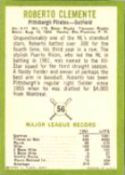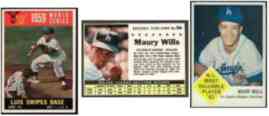Below are short bits & pieces on sportscard & baseball trading card collecting.
Please wander around the website for more info, prices, values & images
on vintage baseball, football, basketball, hockey, sport and non-sports cards.

1971 O-Pee-Chee Baseball
Also referred to as OPC or Topps Canada, most vintage OPC sets were near replicas
of the Topps cards from that year. Exactly same in design they usually only
differed with the addition of French to the backs and some fronts.
To the benefit of collector's OPC made several changes in their 1971 set.
The most obvious and useful was a complete redesign of the card backs and the
addition of another player photo ! Additionly, over 20 cards were changed including
the inclusion of what could be considered the first "Traded" cards. Another
difference: Topps cards #202 and #289 were changed to allow the addition of 2
more Expos to the set.
The 1971 OPC set is legendary for its short print run, estimated at perhaps
just 5% of Topps’ Production. This issue is considered quite elusive, even in Canada.
TOP ROOKIE: Steve Garvey
TOP STARS: Nolan Ryan, Roberto Clemente, Willie Mays, Hank Aaron, Ernie Banks,
Pete Rose, Ted Williams, Thurman Munson, Reggie Jackson, Don Baylor/Dusty Baker RC & MORE !!!
Click for complete
1971 OPC/O-Pee-Chee Baseball checklist and prices
Note: You may be on that page right now.
|



1963 Fleer Baseball Cards
Checklist & Values
1960 & 1961 Fleer baseball card sets of old-timers
like Babe Ruth bombed. Kids wanted Willie Mays & Mickey Mantle.
Topps had rights to baseball cards & gum so Fleer
tried something new ... COOKIES !!!
Cherry flavored cookies with 1963 baseball cards.

1963 Fleer baseball card set was cut short at 66 cards & checklist
by Topps lawsuit. But what 66 cards! Attractive & packed:
Clemente,Koufax... & 2 very scare Short Prints.

Maury Wills 'rookie' card is a story.
Majors in 1959, quickly superstar. But 1963 for rookie ???
In 1959 Topps deemed Wills NOT WORTHY.

 Wills was upset. After 1962 MVP, Topps came knocking but he said "NO!".
Finally, 1967, Wills first Topps & most costly card.
Note: 1961 Post Cereal card, years BEFORE
Wills was upset. After 1962 MVP, Topps came knocking but he said "NO!".
Finally, 1967, Wills first Topps & most costly card.
Note: 1961 Post Cereal card, years BEFORE
 'official' rookie. He also photo-bombed a 1960 Topps card.
'official' rookie. He also photo-bombed a 1960 Topps card.
Disclaimer: Above mostly true - but Wills has said "no feud".
Note: You may be on that page right now.
|

Autographed Gateway Cachets

Gateway Stamp Company has provided collectors over 1 MILLION
authenticated certified autographs over the last 30+ years.
Though a "stamp company", Gateway went down a new creative road
combining art, color photographs, historical events & autographs
with their full-color silk cachet envelopes.
WHAT IS A SILK CACHET ?
A "cachet" is a design on an envelope marking an event.
"Silk" refers to the delicate material the art and photography are
printed on after which it's signed by the player and then post-marked by
the Post Office IN THE EVENT'S CITY !!!
WHY POSTMARKS?
A postmark is a great way to mark historical events and the rules
governing postmarks GUARANTEES that NO Gateway issue can EVER be
re-issued protecting their value !!!
Note: You may be on that page right now.
|

Tobacco Cards
Starting approximately in 1886, sportscards, mostly baseball cards, were often
included with tobacco products, for promotional purposes and also because the
card reinforced the packaging and protected cigarettes from damage. These sports
cards are referred to as tobacco cards in the baseball card hobby. Over the next
few years many different companies produced baseball cards. Tobacco cards soon
started to disappear as the American Tobacco Company tried to develop a monopoly
by buying out other companies.
They were reintroduced in the 1900s, as American Tobacco came under pressure from
antitrust action and Turkish competition. The most famous and most expensive,
baseball card is the rare T206 Honus Wagner. The card exists in very limited
quantities compared to others of its type because Wagner forced the card to be
removed from printing. It is widely (and incorrectly) believed that Wagner did
so because he refused to promote tobacco, but the true explanation lies in a
dispute over compensation.
Soon other companies also began producing baseball and football cards. Sports magazines
such as The Sporting News were early entries to the market. Candy manufacturers
soon joined the fray and reflected a shift toward a younger target audience for cards.
Caramel companies were particularly active and baseball cards were one of the first
prizes to be included in Cracker Jacks. World War I soon suppressed baseball card
production.
© 1995-2019 "InterNet's Baseball Card Store" / Joseph Juhasz ... All Rights Reserved
|




![WIREPHOTO: Nolan Ryan - [04/23/89] 'One Gets Away' (Rangers) Baseball cards value](/jpgs/w/bnr-43.jpg)



